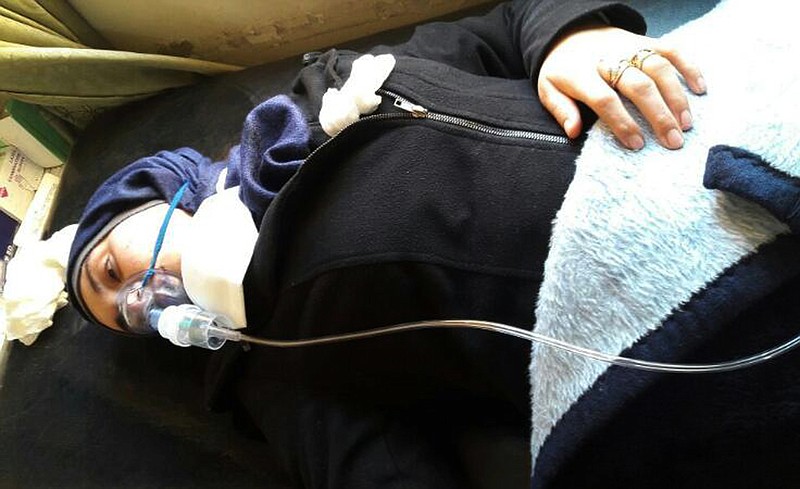Less than a year ago, writing in Politico, Derek Chollet, President Barack Obama's former assistant secretary of defense for international security affairs, was extolling the president's "long-range, flexible, restrained and targeted policy" with Syria.
The president had drawn a red-line for the Middle East country in 2012 over its threat to use chemical weapons, he wrote. Then, the president drew back from that red line after the country exercised that threat in an action that killed nearly 1,500 civilians.
Obama's strategy, Chollet wrote, resulted in Syria, "without a bomb being dropped," agreeing to give up its chemical weapons program and submitting to a multinational coalition that removed it and destroyed it.
"[I]nstead of being seen as a mistake," he said in Politico, as many have considered the former president's decision not to engage the country after the chemical attack, "it should be considered an accomplishment. Judged by what the red line was originally intended to do - address the massive threat from Syria's chemical weapons - it was a success. In fact, it has been perhaps the only positive development related to the Syria crisis."
Well, it was a success except for two things. Nearly 1,500 civilians already were dead in a chemical attack, and, as we all know now, apparently Syria either didn't get rid of all its chemical weapons or has since restocked.
Earlier this week, another attack with what United States experts believe involved chlorine and traces of the nerve agent sarin killed 72, including, as President Donald Trump put it, "innocent children, innocent babies - babies, little babies."
The video footage and photos of some of those children suffering from the effects of the sarin, invented in Nazi Germany in 1939, made the horror thousands of miles away seem all too real, and, the president said, influenced his decision about what to do.
Trump did not announce a red line, wait for the United Nations, dither with a use of force authorization or pull back to let events take shape on their own. Instead, he sent 59 Tomahawk cruise missiles into the government-controlled Shayrat air base in central Syria, where officials say the planes that dropped the chemicals had taken off. The targets were the base's airstrip, ammunition areas, control tower and hangar, officials said.
Even fierce Obama supporters such as Senate Minority Leader Chuck Schumer and House Minority Leader Nancy Pelosi praised the move.
"Making sure (Syrian President Bashar) Assad knows that when he commits such despicable atrocities he will pay a price is the right thing to do," Schumer said.
"Tonight's air strike in Syria appears to be a proportional response to the regime's use of chemical weapons," Pelosi said.
Of course, both followed their statements with a demand that Trump - who in 2013 tweeted a warning that Obama shouldn't attack Syria but should seek congressional approval for any strike - seek an Authorization for Use of Military Force if he intends further action.
Further action, of course, is where the going gets tougher. The president's decision to use force did signal to the region that the U.S. no longer intends to all but stand aside and let powers such as Russia and Iran fill the vacuum.
But are there enough rebels left to arm against Assad? Are there any sanction cards to be played? Would more targeted attacks bring retaliation to U.S. bases in the region? Would any commitment of more U.S. troops to the region let the air out of any positive response the U.S. public had to Trump's use of force?
The president himself has to determine what the Trump Doctrine is. Does it play out from his pronouncements as the noninterventionist candidate who talked about wasted money on wars in the Middle East and about Obama's and former Secretary of State Hillary Clinton's intrusion into Libya? Or does it follow from the bellicose candidate who talked about the country "losing" abroad, about bombing "the s--" out of the Islamic State and about a demand that "we've got to get tough."
We hope there's a middle ground to be traveled because we think that's where most Americans are. They want to see the U.S. back in the game, to be seen as the major player around the world and to be able to react surgically to such atrocities as took place in Syria. But we don't believe they want to see another U.S. military-occupied country involved in a decade-long slog for regime change.
Diplomatically, Trump also will need to figure out how to engage Russia, which became a major player in Syria and in the region when Obama stood aside. If he and Secretary of State Rex Tillerson can, a la Ronald Reagan, convince Russia to somehow stand down or play a lesser role with a very bad actor, he will have achieved a foreign policy success.
We should all hope he finds the right footing on the issue.
